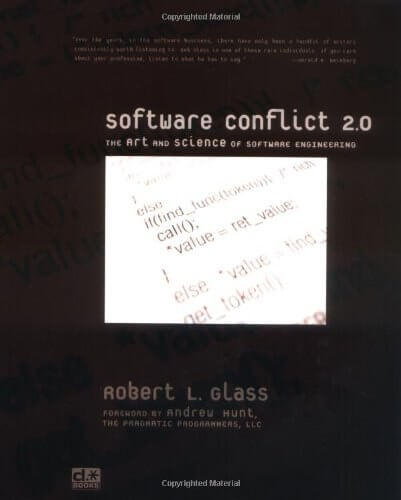Software Conflict 2.0: The Art and Science of Software Engineering

2006年3月10日 出版
Software Conflict 2.0: The Art and Science of Software Engineering updates and expands a neglected classic in the field. The nearly 60 essays in this book–always easily digestible, often profound, and never too serious–are the work of pioneer Robert L. Glass, 50 year software veteran, and author or editor of more than 25 books, including the recent bestseller Facts and Fallacies of Software Engineering. As loyal Glass readers have come to expect, Software Conflict 2.0 takes up large themes and important questions, never shying away from controversy. Robert Glass has a unique perspective, owing partly to his longevity in the field, partly to his breadth and depth of experience as a practitioner, and partly to his experiences on multiple continents crossing back and forth between the worlds of the university and the professional programming shop. No matter what unique corner of the software engineering world you call home–be it aerospace or e-commerce–whether you are a researcher, hardcore coder, consultant, or manager, Software Conflict 2.0 tackles questions and conflicts that you will recognize. Bob Glass’s wide and deep perspective on the art and science of software engineering will widen and deepen your own perspective. Pragmatic Programmer Andy Hunt writes in his Foreword to this book, “Eleventh-century philosopher Pierre Abelard taught that, ‘The beginning of wisdom is found in doubting; by doubting we come to the question, and by seeking we may come upon the truth.’ Welcome to Bob’s essays on software conflict. Here you’ll find the seeds of doubt, some underlying questions, and a fellow seeker.” We couldn’t agree more. The first edition of Software Conflict was published circa1990 and, until now, has been out of print for some time. Why? Mainly because that’s the normal pattern for software books: a new book is hot when it hits the streets, but then trends change, paradigms shift, and eventually the publisher stops placing orders with the printer. As hundreds of new books are published every year, a real treasure can be buried in the shifting sands. Sometimes the significance of a software book transcends the endless cycle of trends and revolutions. In fact, some of the great software books continue to be discussed even decades after their original publication. Why do people keep reading these “dated” software engineering books? Because the insights of these great books are timeless, as valid today as they were yesterday. Because these insights help us become better software professionals, better researchers, better managers. And because the writings of a computing pioneer like Robert L. Glass might just reveal something about where we are today and where we?re headed. Software Conflict 2.0 features six new essays by Robert Glass and a new Foreword by Andrew Hunt of the Pragmatic Programmers.